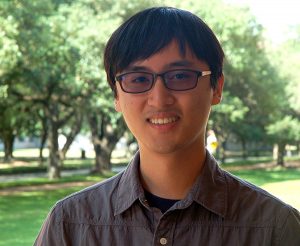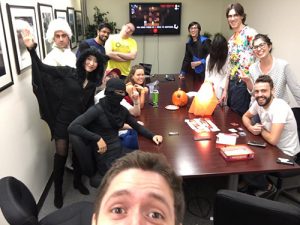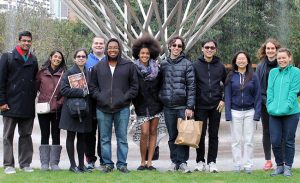 Lee Chen, a rising third-year Ph.D. student in the Computer Science Department at Rice University, was in his junior year of a double major in molecular biology and math at Wesleyan University when he realized he enjoyed analyzing data more than collecting it.
Lee Chen, a rising third-year Ph.D. student in the Computer Science Department at Rice University, was in his junior year of a double major in molecular biology and math at Wesleyan University when he realized he enjoyed analyzing data more than collecting it.
“The optics lab where we worked was in a dark basement where we’d excite our samples using lasers and observe them,” he said. “It is so important to get pure data. We were working long hours, perfecting our data collection techniques, and producing large amounts of data. In my third year, I realized how much more excited I got about analyzing versus collecting the data.”
When Chen recognized his interests led in a slightly different direction, it was too late to change his major. He enjoyed studying STEM subjects in Wesleyan’s liberal arts environment, so it was not difficult to complete his dual degree programs while exploring graduate schools where he could specialize in data analysis.
Although he had done simple coding on side projects, his first programming class was a bioinformatics course in his senior year at Wesleyan. “Bioinformatics offered in Wesleyan was like an introductory programming class with applications in biology,” he said. “I realized if I ever wanted to work in bioinformatics, I’d need a computer science background.”
He looked for universities offering either a professional master’s in bioinformatics or a Ph.D. program in computer science, and chose Rice’s CS department after visiting during a recruiting weekend. Chen said, “I knew I wanted a good balance of student life and academics. During Rice’s recruiting weekend, I chatted with a fair number of students who had time to do other things after work, and they had a variety of interests. That relaxed atmosphere felt right – especially one night we were hanging out pretty late at Star Pizza and no one was having to rush back to their lab. Also, Luay [Nakhleh, Chen’s adviser] is a front-runner in a lot of bioinformatics research.”
Chen was drawn to bioinformatics because it combined his previous experience in biology with his newly discovered interest in using computer science to solve problems. “I had majored in molecular biology because I liked it, then realized the lab work of molecular biology wasn’t as interesting to me as I had expected. But combining the pure academic interest in biology with my interest in finding solutions to existing problems, that’s the best of both worlds.”
He also hoped to find or build a community of friends at Rice. He said that undergraduate programs at schools like Wesleyan and Rice pitch communities at new students in ways that make it easy to get involved and find a group of friends.
“But as a graduate student, you have to be more proactive and spend energy to create those same types of interactions. Rice has a healthy lifestyle for its graduate students, but even Rice’s Ph.D. program can become tiring and wearing –and you need a support network. If you don’t have a group of friends you are close to, you miss out on a lot of that support.”
In his first semester as a graduate student at Rice, the Computer Science Graduate Student Association (CSGSA) hosted a board games night and Chen attended for the social aspect even though he hadn’t played board games before. He said, “I realized there was a community of students who enjoyed relaxing and playing board games. I was part of it even though board games hadn’t been on my radar before.”
The following semester’s CSGSA Board Games Night was less well attended, and Lee realized the pool of potential members needed to expand. He asked about a campus-wide games club and was surprised none existed, so he started organizing his own events. “I thought if I enjoyed the games, I would probably enjoy the people who came to play; that is how I’d made friends in the past, through shared interests. So I hosted a Halloween game night at the Rice Graduate Apartments and had a good turnout.”
In his first year at Rice, Chen said the campus-wide GSA included board games nights as part of their events leading up to Beer Bike, and a sub-community quickly developed around the games. Then the GSA’s game nights ended with Beer Bike. Chen said, “that community could have continued, but without the catalyst of the games activity, the friends friendships that were forming just ended.”
So Chen launched GradGames. He said, “It isn’t strictly a board games club, we always offer a combination of games that include at least one a video game or other type of game. And once a semester, we host an outing outside the Rice campus. Going to places like the McGovern Centennial Garden in Hermann Park and downtown Houston lets people who don’t usually play board and video games get involved and meet others in the community.”
Chen said each event is well attended and he expects the members will continue suggesting different games and outings because their interest remains high. “It’s been inspiring to see the difference the club is making. The students who attend are genuinely happy to be part of the community we’ve helped foster.”
He worked closely with the GSA officers to ensure game nights were included again in this year’s events leading up to Beer Bike. “It is nice to have alternative events that are not centered around Valhalla available, and the GradGames community was happy to provide it.”
In April, Chen was one of six students recognized by the GSA for their service and achievements on behalf of graduate students. “I may have received the award because of the community I had started around the GradGames,” he said. “But the real contribution came from the community and enthusiasm of the members.”
Lee H. Chen’s Ph.D. adviser is Luah Nakhleh; he matriculated in Fall 2015.

